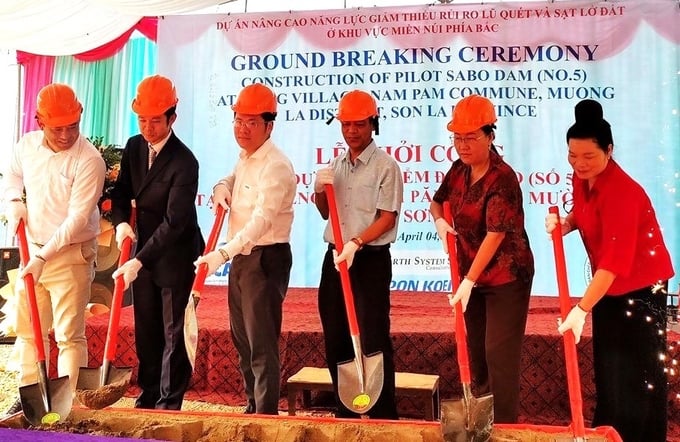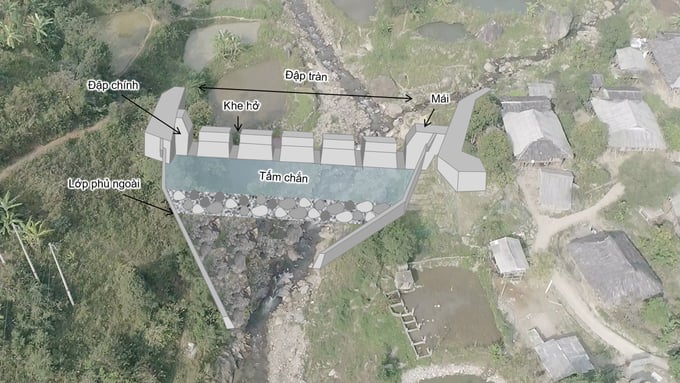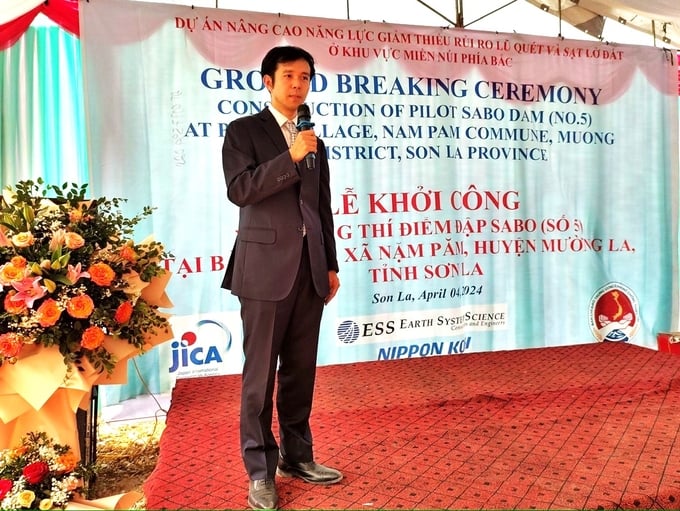May 20, 2025 | 07:45 GMT +7
May 20, 2025 | 07:45 GMT +7
Hotline: 0913.378.918
May 20, 2025 | 07:45 GMT +7
Hotline: 0913.378.918

Delegates performing the groundbreaking ceremony for the construction of the experimental Sabo dam. Photo: Le Quynh.
The Vietnam Disaster and Dyke Management Authority under the Ministry of Agriculture and Rural Development, in collaboration with Son La province's Department of Agriculture and Rural Development and the Japan International Cooperation Agency (JICA) Vietnam Office, held a groundbreaking ceremony for the construction of the first experimental Sabo dam in Vietnam at Pieng village, Nam Pam commune, Muong La district. The ceremony was held on the morning of April 4 in Son La province.
The Sabo dam is one of the most effective engineering solutions to mitigating the impacts of erosion and flash floods. These dams are typically constructed on the upper reaches of rivers with steep slopes and high flow velocities. Additionally, Sabo dams help retain sediment, floating debris, and prevent damage in downstream areas.

Simulation of the experimental Sabo dam in Muong La district, Son La province.
The construction of the experimental Sabo dam is one of the most important activities within the framework of the Technical Cooperation Project for Strengthening the capacity to cope with and minimize damages caused by flash floods and landslides for the northern mountainous region of Vietnam. The project has been implemented across 14 northern mountainous provinces of Vietnam since 2022 through a partnership between the Vietnam Disaster and Dyke Management Authority and JICA.
The construction of the experimental Sabo dam in Son La province is expected to serve as a reference for the Government of Vietnam to establish technical standards for Sabo dam design, before initiating the construction of other Sabo dams in high-risk areas. Furthermore, the contruction of this dam will reinforce the National Planning for Disaster Prevention and Water Resources from 2021 to 2030, with a vision towards 2050.

Mr. Suzuki Takashi, Advisor on Disaster Risk Management at the Ministry of Agriculture and Rural Development, delivering remarks at the ceremony. Photo: Le Quynh.
Flash floods and landslides caused by heavy rainfall have occurred at an increased frequency within the last few years. Consequently, they resulted in severe damages in the northern mountainous region of Vietnam.
In Muong La district, flash floods and landslides in August 2017 resulted in 15 fatalities and disappearances, 15 injuries, and up to 705 billion Vietnamese dong in total economic losses. Continuous heavy rains in early August 2023 also led to flash floods and landslides within the district, causing damage to 134 local residences.
Additionally, JICA plans to actively collaborate with the Government and people of Japan to support Vietnam in disaster risk management in the immediate future.
Translated by Nguyen Hai Long

(VAN) Vietnam aims to become a 'leader' in the region in the capacity and managing effectively soil health and crop nutrition.
![Reducing emissions from rice fields: [Part 1] Farming clean rice together](https://t.ex-cdn.com/nongnghiepmoitruong.vn/608w/files/news/2025/05/05/z6509661417740_a647202949c539012a959e841c03e1d3-nongnghiep-143611.jpg)
(VAN) Growing clean rice helps reduce environmental pollution while increasing income, allowing farmers to feel secure in production and remain committed to their fields for the long term.
/2025/05/19/5136-1-144800_230.jpg)
(VAN) The Nghe An Provincial People's Committee has just approved the list of beneficiaries eligible for revenue from the Emission Reductions Payment Agreement (ERPA) in the North Central region for the year 2025.

(VAN) 14 out of 35 domesticated elephants in Dak Lak province have had their living conditions improved, with 11 of them currently participating in the non-riding elephant tourism model.

(VAN) Muong Nhe Nature Reserve hopes that being upgraded to a national park will lay the foundation for forest protection efforts to be carried out in a systematic, modern, and sustainable manner.
/2025/05/16/3923-2-171845_52.jpg)
(VAN) Lower costs, higher yields, and improved soil quality are outstanding benefits that soybeans bring when integrated into the crop rotation system.

(VAN) The 'For a Green National Environment' programme aims to promote a green lifestyle, support businesses in implementing ESG practices, and turn Net Zero commitments into concrete actions.